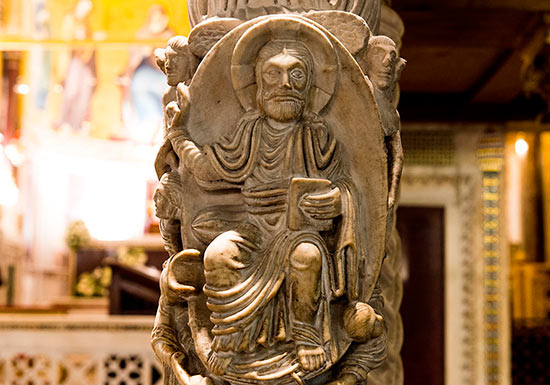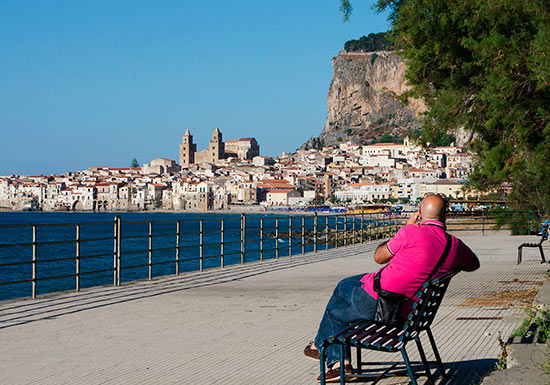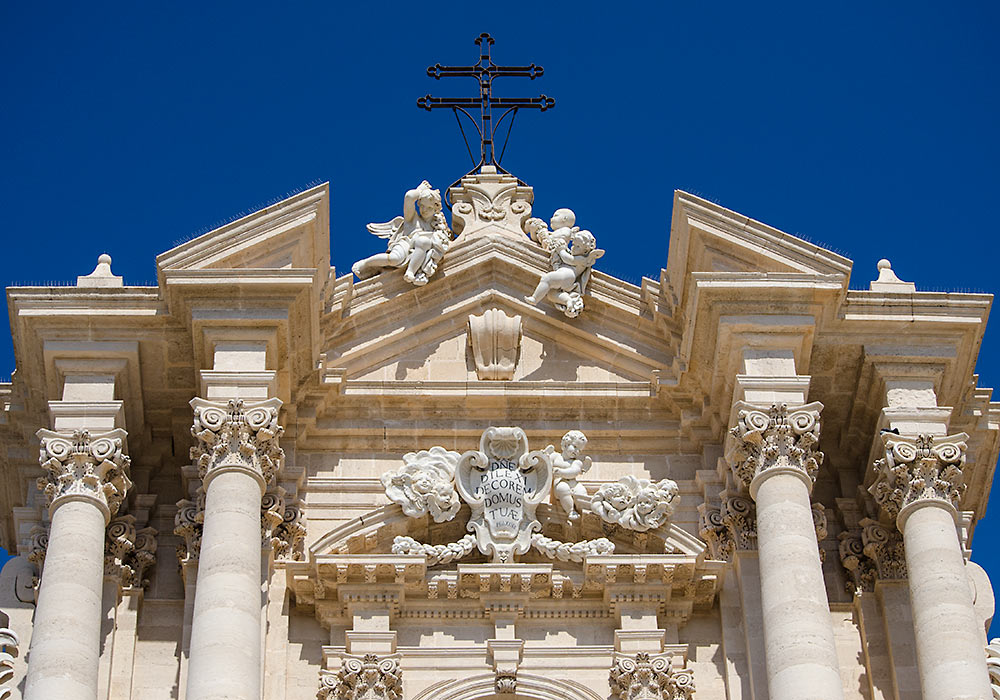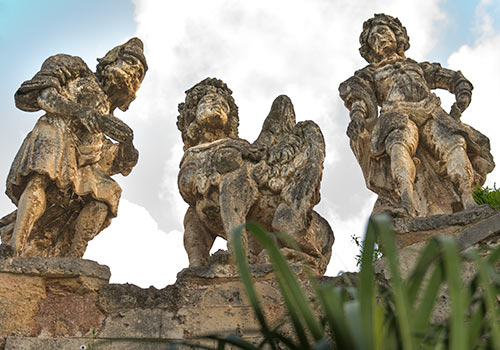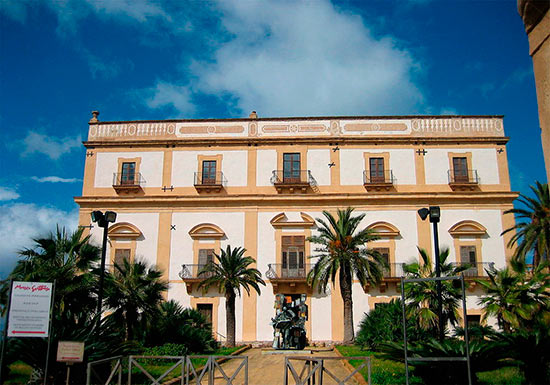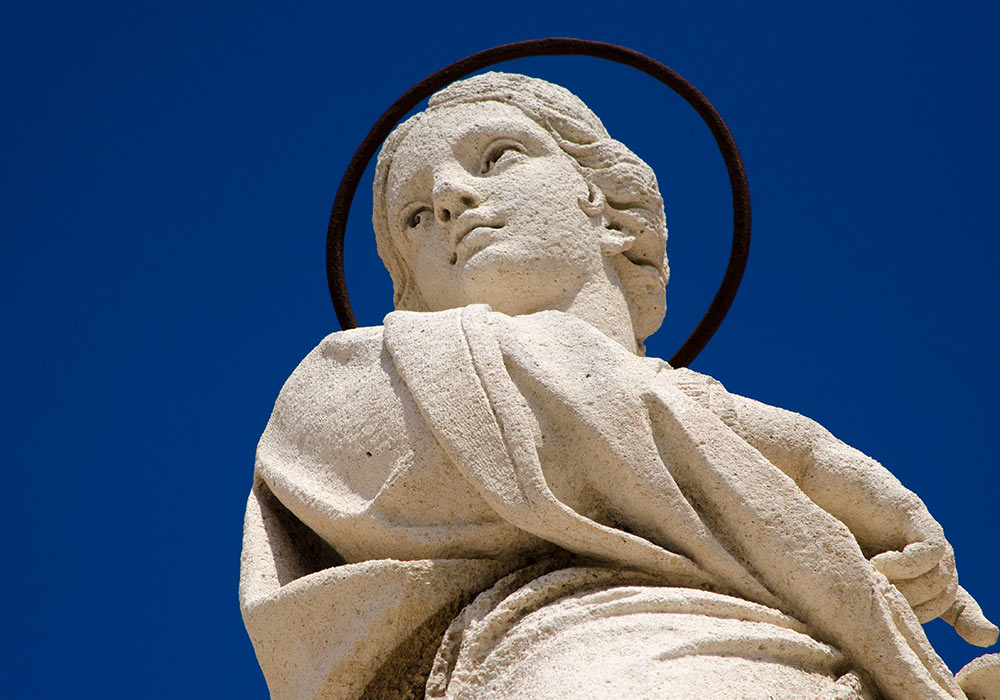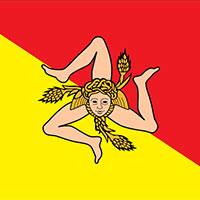Richard Wagner in Sicily 1881–1882
Richard Wagner went to Palermo to complete his last music drama, Parsifal.
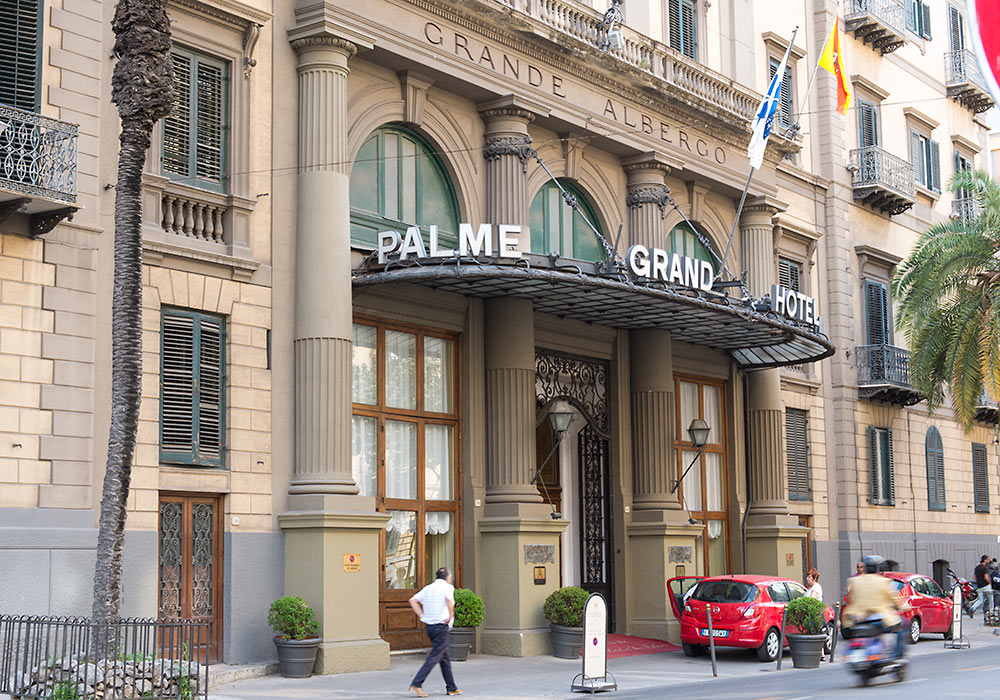
Richard Wagner and his family arrived at Hôtel des Palmes (now: Grand Hotel Et Des Palmes), on 5 November 1881.
Photo: Per-Erik Skramstad / Wagneropera.net
Places Richard Wagner visited in Sicily
- Hôtel des Palmes (Palermo)
- Villa Giulia
- English Gardens [Giardino Inglese]
- Monreale cathedral
- Orto Botanico
- Favorita
- Cathedral in Palermo
- La Zisa
- Bagheria (but probably not Villa Palagonia)
- Val Guarnero
- Soluntum
- Villa del Principe Gangi, Piazza dei Porazzi
- Acireale
- Taormina
- Greek theatre (Taormina)
- Hôtel Timeo (Taormina)
- Messina (in transit)
- More about Richard Wagner in Sicily on Wagneropera.net
5 November 1881
Richard Wagner and his family arrives at Hôtel des Palmes (now: Grand Hotel Et Des Palmes), occupying room 24, 25 and 26.
The journey to Palermo started 1 November and went via München, Verona and Napoli.
7 November 1881
R. had a restless night, since he had taken medicine, but he is looking well. He arranges his worktable in the salon, and the situation pleases him. In the afternoon we drive to Monreale. [Added on the next page, under Tuesday: "Yesterday, on the journey to Monreale, R. notices a small and very independent poodle, a favourite breed of his, and in the evening he is still thinking of the little creature, having been struck by its intelligence."] Sublime impression: "What people they must have been to build such a thing!" R. exclaims. We are enchanted by the cloisters. The valley of oranges is like a fairy tale, and when we return home we feel that nothing less than Shakespeare will do. — We begin H[enry] VI, Act I, the children showing great interest. As he reads, R. looks so wonderfully young that I have to tell him so. And when we are discussing this first act, he says, "He is the greatest of them all." — "What images!" he exclaimed as he reads Exeter's "Like captives bound to a triumphant car."
(Cosima Wagner’s Diaries)
11 November 1881
"Lovely sunshine, cheerful breakfast. Work for R., he is pleased to have overcome a bad passage at the end of the third act [of Parsifal]. In the evening, as he is writing his second page, he recalls the irrational way Berlioz at times introduced his instruments, and he is glad to have smoothed out this passage successfully. […] After lunch we, he and I, take a lovely drive to the Villa Giulia, delighting in all the blooming vegetation; R. is pleased by a palm tree, its hanging leaves laden with fruit, also by large red blossoms which look to him like butterflies; sea and mountains give delight. There were no errors of diet today, and in the morning he talked about the wretchedness of strong desire [das Schreckliche des Gelüstes]."
(Cosima Wagner’s Diaries)
11 November 1881
At 12 Dr. Berlin arrives, making some changes in R.'s diet. […] Recently he made the remark, "I am not a ghost, after all – with my Parsifal I am again coming along with something new." – We take a 2-hour walk which enchants R., in the English Gardens [Giardino Inglese], heavenly air and indescribable colors.
(Cosima Wagner’s Diaries)
21 November 1881
In the morning R. begins a letter to the King, in the afternoon we drive to the Villa Tasca, which is charming and pleases R. greatly. (Cosima Wagner: Diaries)
25 December 1881
Cosima receives the (unfinished) Parsifal score for her birthday.
28 December 1881 (Wednesday)
He works and goes for a walk in the garden before lunch, but at table I can already see he is in an ill humor, and the champagne he orders does not cheer him up. I can think of no reason for it, except that his work is absorbing him. However, we drive to Monreale and delight in the splendid cathedral, feeling ourselves transported back into the spirit of that distant time as we gaze on this ideal representation of it.
(Cosima Wagner’s Diaries)
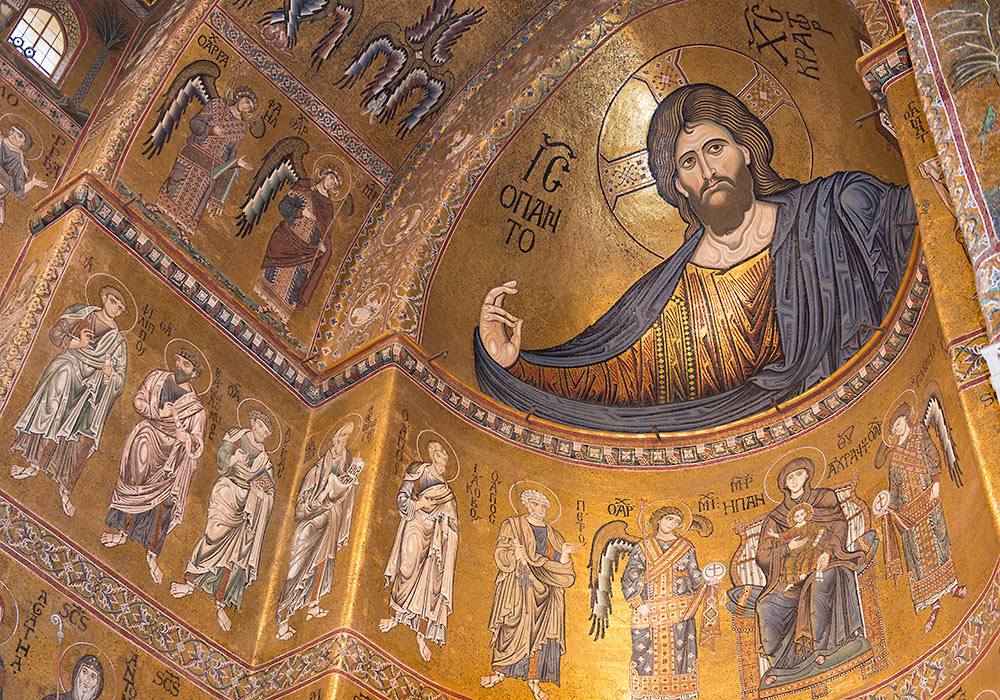
Richard Wagner visited the magnificent cathedral in Monreale, near Palermo, several times while the composer was finishing Parsifal.
Photo: Per-Erik Skramstad / Wagneropera.net
30 December 1881
R. slept well, but after his bath he has a chest spasm. However, since the sun is shining, he is agreeable to having breakfast in the conservatory. But work costs him some effort, and he longs for it to be completed, saying it is a torment to him, he is afraid of orchestrating too heavily.
(Cosima Wagner’s Diaries)
31 December 1881
The sun is not quite loyal to us, it fights through only now and then, and R. again has a chest spasm. All too many things vex him - struggles with an ink which will not flow and a thousand other petty things of which he tells us vexedly at lunch, for which he arrives late; but his mood then changes to one of great merriment when I agree with him that life is terrible, in the little as well as the big things. After lunch we drive to the Orto Botanico and delight in the splendid trees there. He works in the evening, and when I ask him at table how much he still has to do, he says mournfully, "Fifteen pages." and then with quite satisfaction, "Fourteen" (with a slight Saxon accent).
(Cosima Wagner’s Diaries)
5 January 1882
He takes quite a long rest after lunch, and then we drive, he and I, via the English Garden to the Favorita. When I tell him I have just been thinking of Parsifal and am pleased that this last work of his is also his masterpiece, he replies, or rather, interrupts me very excitedly. "No, no, I was telling myself today that it is quite remarkable that I held this work back for my fullest maturity; I know what I know and what is in it; and the new school, Wolz. and the others, can take their lead from it." He then hints at, rather than expresses, the content of this work, "salvation to the savior" – and we are silent after he has added, "Good that we are alone." […] And in gentle, indeed uplifted spirits, we return home. He goes to his work, completes two pages today, and joins us at table, somewhat excited but in cheerful mood.
[…]
He then talks about his instrumentation, compares it with painting techniques, then relates atrocoties committed by the Russian government and declares that what is best in the nation can certainly be found among the nihilists, in the higher spheres everything is rotten and decayed.
[…]
Rub. [Joseph Rubinstein] plays Weber’s A-flat Major Sonata and his "Polonaise" which again make R. feel that he is "no musician"; despite some lovely passages, the sonata reminds him of Kalkbrenner, and he finds its stiffness og form and applaus-seeking brilliance distateful; he says this piano literature shows not the slightest trace of Beethoven's influence.
(Cosima Wagner’s Diaries)
6 January 1882
R. then goes to his work, which, however, puts a great strain on him today. Page 331, with the harps (Parsifal mounting the steps to the altar), causes him much exertion […] We drive to the Favorita, but he does not feel well.
(Cosima Wagner’s Diaries)
12 January 1882
We visit the cathedral, La Zisa (castle in the western part of Palermo), and on our return R. works. He comes to supper in an animated mood and assures us that he would not hesitate for a moment to sacrifice his works for the sake of the children, not for a single moment – Tristan for Isolde, Meistersinger for Eva, the Ring for Siegfried. "That's life," he says. Then he jokes about having chosen a bad country in which to get them married off, for here they would have to become Catholics, and that would seem to him a very great shame. In the evening he talks a lot with Rub. about the harp parts […]
(Cosima Wagner’s Diaries)
13 January 1882
On 13 January 1882 the orchestration of Parsifal is completed!
Returning home, I find R. very run down, and at lunch he even leaves the table for a while, but he soon returns and proposes the toast very cordially. After lunch we visit a house which has been offered us. He then works, and in the evening, in honor of Jouk., the chorus from Die Feen is played, then the witch's ballad (sung by R.) and the Overture to Die Feen. During the last of these R. goes out, I go to see what he is doing – he is putting the finishing touches on his score: "It gave me no rest," he says. The splendid sounds of the Tannhäuser march ring out, he comes in, and – all is completed! With this, as with all his other works, he had feared being interrupted by death – that is what he told us at lunch today! […] We drink to Parsifal. Our friends depart later than usual, we stay up, R. and I, and talk of the various completions (Tristan, Msinger –), and of life in general, and go off to bed in a mood of exaltation and peace. – A few more things I have to tell about this evening; first that R. told us the story behind his first ballad (boy and swan). Then, that he spoke about the orchestration of Parsifal; the wind instruments would complain, he said, but when he recalled how, in Martha, for instance, the four horns are used time and again in the stupidest way, then he felt comforted. – He tells me that the A-monor chord (as Kundry falls to the ground) will make an impression on me; the terror of sanctity flows from it, and it will have to be very beautifully played, he says.
(Cosima Wagner’s Diaries)
14 January 1882
[…]
We go for a short walk, R. pays two calls, and as we are returning, we hear some long, sustained, solemn tones; the sounds come closer, arousing feelings of earnestness and exaltation in us; we listen; a funeral procession passes by, the music simple but not vulgar, extremely beautiful, expressively played; R. is completely entranced: "Oh, what a divine thing music is – how it transforms everything!" he exclaims. Unfortunately he is annoyed by the garments and faces of the prelates.
(Cosima Wagner’s Diaries)
19 January 1882
At 12 o’clock he goes for a walk with the children in the Engl. Gardens, and in the afternoon we visit the Aumale gardens, which are quite splendid and which please R., too, even if his mood is still irritable. Seeing oranges growing beside a rose, he says, "How vulgar they seem beside that blossom!"
(Cosima Wagner’s Diaries)
20 January 1882
Glorious sunshine; R. had a good night, and in the morning he jokes about the success of Tristan - he says he feels like the long-legged grasshopper, "singing its wonted song in the grass. He likens Härtel to earthworms, which emerge the moment anything moves. And at 11:30 we drive off to Bagheria with Prince Gangri, Count Tasca, and the children in four carriages. The outing is a complete success. The view from Val Guarnero enchants R., it seems the lovliest thing ever seen. Lunch at Soluntum with the Prince is very pleasant.
[…]
At home we unfortunately find a report on the B[ülow] concerts in Berlin, the fêting of Brahms makes a dismal impression. A letter from Gobineau also brings some vexation, since R. is unable to understand why he does not join us here.
(Cosima Wagner’s Diaries)
2 February 1882
The Wagners leave Hôtel des Palmes, and move into Villa del Principe Gangi, Piazza dei Porazzi.
20 March 1882
The Wagners and Count Gravina move to Acireale (a town on the East coast of Sicily, between Catania and Taormina).
28 March 1882
Richard Wagner has a severe heart attack.
2 April 1882 - day trip to Taormina
Richard Wagner and Cosima visit Taormina on a day trip. Cosima writes in her diaries:
R. is particularly delighted by the columns. On the homeward journey [to Acireale] he says how dreamlike is the sight of such things, one is not in fact moved by them at all. I understand this feeling only too well: when one's gaze is directed towards the depths, the surface no longer has much effect. Yet even in this lack of effect there is a peculiar feeling of well-being. – We met S[iegfried]'s Latin teacher, Herr Toussaint, in the Hôtel Timeo. concering which R. says we should have fled there in 1858 and spared ourselves many torments. The children could have lived on prickly pears! […] On arrival in Taormina R. catches sight of a little island [probably Isola Bella]; he says that in earlier days he always longed for something like that, in order to cut himself off from the world. "If only Wesendock were to give me such an island, " he had thought to himself, a"and Minna had no great desire to go there with me!" And he adds, "It was the thought that there was much I could still do." – As the children are singing the "Shepherd's Song" from Tannhäuser, he tells me that he heard it sung by a shepherd in Schreckenstein, near Teplitz – though of course in a completely different form.
(Cosima Wagner’s Diaries)
10 April 1882
Richard Wagner and his family leave Acireale for Messina
14 April 1882
The Wagners arrive in Napoli at 8 o’clock "in somewhat grey weather".
Self-portrait
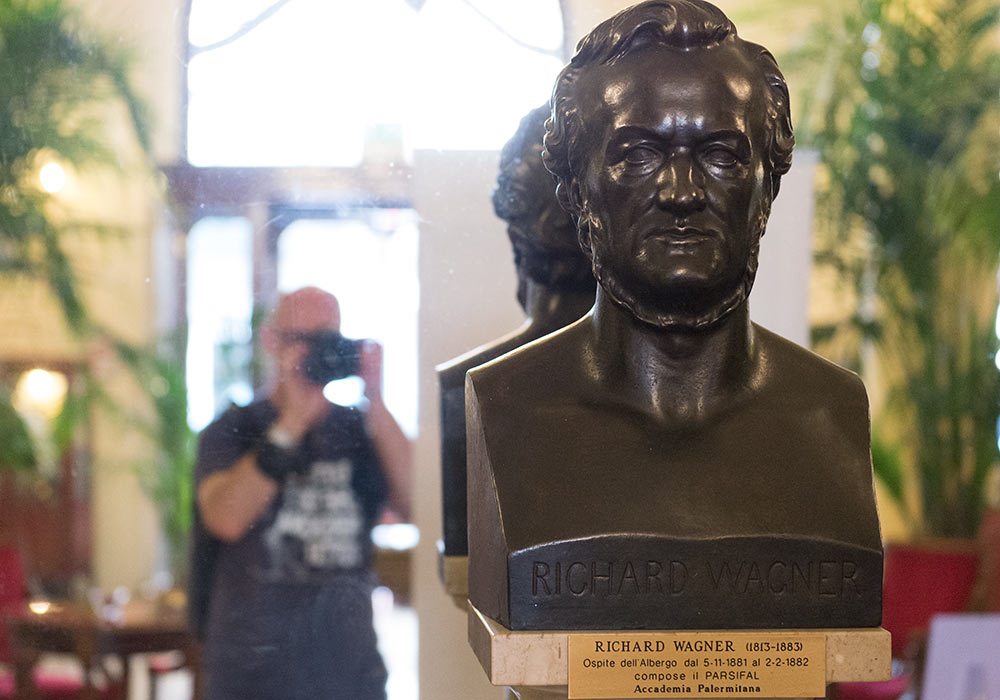
Recommended reading on Sicily
The Grand Hotel et des Palmes
The Grand Hotel et des Palmes was founded in 1874 by the family Ingham - Whitaker. The building was built in 1856 and connected by a secret passage to the Anglican Church which still faces the hotel.
The patrician house consisted of two floors, a winter garden (now Hall) and an exotic garden stretching to the sea.
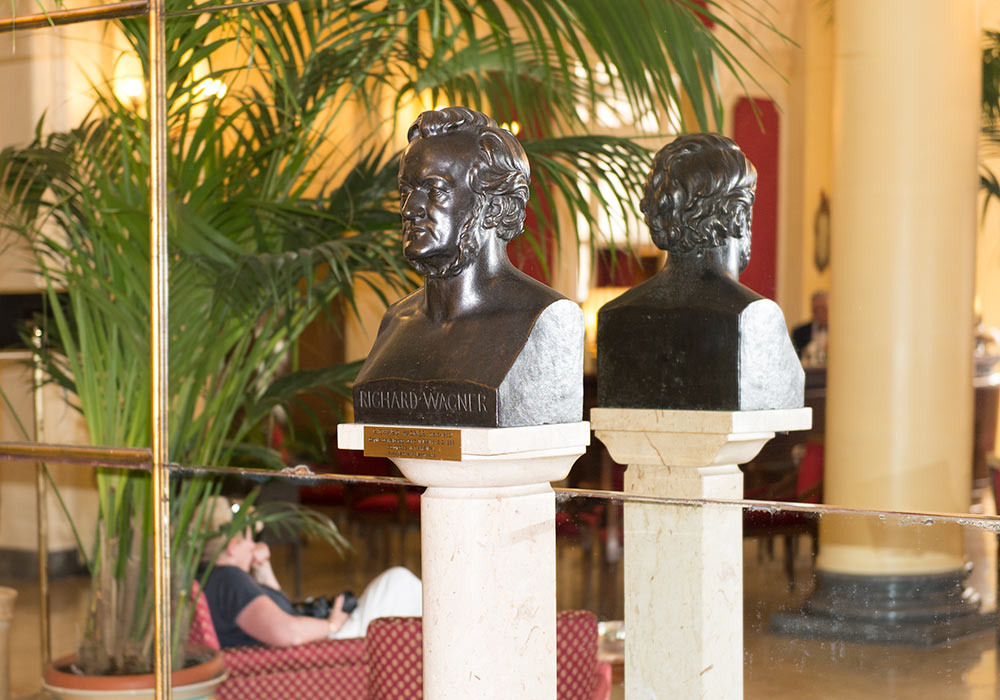
A bust of Richard Wagner in the foyer of Grand Hotel Et Des Palmes (aka Hôtel des Palmes), Palermo.
Photo: Per-Erik Skramstad / Wagneropera.net
Sources
- Google Maps
- Cosima Wagner's Diaries. Edited and annotated by Martin Gregor-Dellin and Dietrich Mack. Translated and with an introduction, Postscript, and additional notes by Geoffrey Skelton.
- Photos: Per-Erik Skramstad / Wagneropera.net (unless otherwise specified).
Sicily in Operas
- Les Vêpres siciliennes (Giuseppe Verdi)
- Tancredi (Gioachino Rossini)
- Cavalleria rusticana (Pietro Mascagni), it has often been performed in a so-called Cav/Pag double-bill with Pagliacci by Ruggero Leoncavallo.
- Béatrice et Bénédict (Hector Berlioz). Based on Shakespeare's Much Ado About Nothing.
- Król Roger (Karol Szymanowski )
Sicily in the Movies
- The Godfather I-III (Francis Ford Coppola)
- L'avventura (Michelangelo Antonioni)
- Kaos (Paolo and Vittorio Taviani)
- Nuovo Cinema Paradiso (International title: Cinema Paradiso), (Giuseppe Tornatore)
- Baarìa (Giuseppe Tornatore)
- Malèna (Giuseppe Tornatore)
- The Star Maker (1995) "L'uomo delle stelle" (Giuseppe Tornatore)
- La terra trema (Luchino Visconti)
- The Big Blue (Luc Besson)
Alesa Arconidea - Aleister Crowley in Cefalù - Bagheria - Balconies in Sicily - Baron Wilhelm von Gloeden - Baroque architecture in Sicily - Birds in Sicily - Caccamo - cars in Sicily - Castelmola - Cats in Italy - Collesano - Death in Sicily - Death in Sardinia - Entella - Film locations in Sicily - Fish, fishermen and fish markets in Sicily - Gela - Gibilmanna - Greeks in Sicily - Halaesa Arconidea - insects in Sicily - Linguaglossa - Lizards in Sicily - Maps of Sicily - Monreale Cathedral - Monreale Cloister - Life in Sicily - Mosaics in Sicily - Mount Etna - Museums and Exhibitions - Normans in Sicily - Palermo: Museum of the Holy Inquisition - Palermo: the Norman Palace - Palermo: Oratorio del SS. Rosario, San Domenico - Palermo: the Palatine Chapel (Cappella Palatina) - Palermo: Richard Wagner in Sicily - Palermo: La Zisa - Palermo: Chiesa Santa Maria della Catena (Church of Saint Mary of the Chain) - Syracuse: The Archeological Park - Tommaso Fazello - Tuna fishing in Sicily (La Mattanza) - Videos - Villa Palagonia (Bagheria) "The Villa of Monsters" (Villa dei Mostri) - Villa Romana del Casale (near Piazza Armerina) - Sicily in Art - Sicilian Art and Artists - The White Lotus season 2 locations in Sicily -
Acireale - Agrigento - Castelbuono - Catania - Cefalù - Enna - Erice - Modica - Monreale - Noto - Palermo - Ragusa Ibla - Segesta - Selinunte - Taormina - Syracuse (Siracusa) - Trapani -

